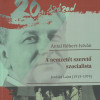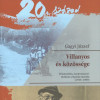Róbert-István Antal: The Socialist Who Loves His Nation. Lajos Jordáky (1913-1974).

With the support of our institute, the book by Róbert-István Antal: The Socialist Who Loves His Nation. Lajos Jordáky (1913-1974) was published in Cluj by Kriterion Publishing House and Transylvanian Museum Society.
Can a good communist be a good Transylvanian Hungarian? As a social-democratic and then communist politician, and as a devout Marxist who was displaced into the cultural sphere after the establishment of the state socialist dictatorship, he was confronted with the dilemma: Can the class emancipation of the Transylvanian Hungarian communities solve the challenges of minority existence?
The book's introduction and table of contents can be read here (in Hungarian).


